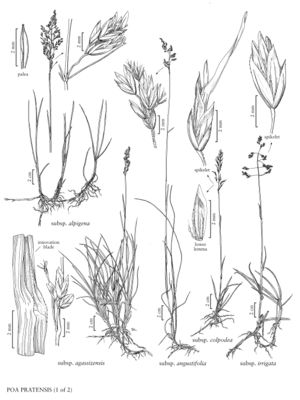Difference between revisions of "Poa pratensis subsp. agassizensis"
FNA>Volume Importer |
GeoffLevin (talk | contribs) m (Restored umlaut in Love) |
||
| (7 intermediate revisions by 2 users not shown) | |||
| Line 1: | Line 1: | ||
{{Treatment/ID | {{Treatment/ID | ||
|accepted_name=Poa pratensis subsp. agassizensis | |accepted_name=Poa pratensis subsp. agassizensis | ||
| − | |accepted_authority=(B. Boivin & D. | + | |accepted_authority=(B. Boivin & D. Löve) Roy L. Taylor & MacBryde |
|publications= | |publications= | ||
|basionyms= | |basionyms= | ||
|synonyms={{Treatment/ID/Synonym | |synonyms={{Treatment/ID/Synonym | ||
|name=Poa agassizensis | |name=Poa agassizensis | ||
| − | |authority= | + | |authority= |
| + | |rank=species | ||
}} | }} | ||
|hierarchy=Poaceae;Poaceae subfam. Pooideae;Poaceae tribe Poeae;Poa;Poa subg. Poa;Poa sect. Poa;Poa pratensis;Poa pratensis subsp. agassizensis | |hierarchy=Poaceae;Poaceae subfam. Pooideae;Poaceae tribe Poeae;Poa;Poa subg. Poa;Poa sect. Poa;Poa pratensis;Poa pratensis subsp. agassizensis | ||
| Line 18: | Line 19: | ||
-->{{Treatment/Body | -->{{Treatment/Body | ||
| − | |discussion=<p><i>Poa pratensis </i>subsp.<i> agassizensis</i> was described as native to prairies and mountain grasslands of North America; this has not been confirmed. It grows throughout the drier, cool-temperate range of the species in North America. It may consist of ecotypes derived from cultivated material, or be a native form that has adapted to xeric conditions. The least distinctive of the subspecies treated here, it closely approaches < | + | |discussion=<p><i>Poa pratensis </i>subsp.<i> agassizensis</i> was described as native to prairies and mountain grasslands of North America; this has not been confirmed. It grows throughout the drier, cool-temperate range of the species in North America. It may consist of ecotypes derived from cultivated material, or be a native form that has adapted to xeric conditions. The least distinctive of the subspecies treated here, it closely approaches <i></i>subsp.<i> angustifolia</i> in having involute leaves and small spikelets, but has shorter and broader leaves, and more condensed panicles.</p> |
|tables= | |tables= | ||
|references= | |references= | ||
| Line 27: | Line 28: | ||
-->{{#Taxon: | -->{{#Taxon: | ||
name=Poa pratensis subsp. agassizensis | name=Poa pratensis subsp. agassizensis | ||
| − | + | |authority=(B. Boivin & D. Löve) Roy L. Taylor & MacBryde | |
| − | |authority=(B. Boivin & D. | ||
|rank=subspecies | |rank=subspecies | ||
|parent rank=species | |parent rank=species | ||
| Line 34: | Line 34: | ||
|basionyms= | |basionyms= | ||
|family=Poaceae | |family=Poaceae | ||
| + | |illustrator=Sandy Long | ||
| + | |illustration copyright=Utah State University | ||
|reference=None | |reference=None | ||
|publication title= | |publication title= | ||
|publication year= | |publication year= | ||
|special status= | |special status= | ||
| − | |source xml=https:// | + | |source xml=https://bitbucket.org/aafc-mbb/fna-data-curation/src/200273ad09963decb8fc72550212de541d86569d/coarse_grained_fna_xml/V24/V24_734.xml |
|subfamily=Poaceae subfam. Pooideae | |subfamily=Poaceae subfam. Pooideae | ||
|tribe=Poaceae tribe Poeae | |tribe=Poaceae tribe Poeae | ||
Latest revision as of 22:35, 3 December 2021
Plants moderately to densely tufted, shoots clustered. Basal branching intra- and extravaginal. Culms 20-40(50) cm. Innovation shoot blades usually shorter than 15 cm, 0.8-2 mm wide, all involute or folded, adaxial surfaces sparsely pubescent. Panicles 4-8 cm, ovoid, narrowly pyramidal or loosely contracted, with 2-5 branches per node; branches ascending, smooth or sparsely to moderately densely scabrous, with several spikelets per branch. Spikelets lanceolate, not bulbiferous; florets normal. Glume keels strongly compressed, sparsely to moderately scabrous; upper glumes shorter than to nearly equaling the lowest lemmas; lemmas 2-4 mm, finely muriculate, lateral veins glabrous; palea keels scabrous, glabrous, intercostal regions glabrous. 2n = 56.
Discussion
Poa pratensis subsp. agassizensis was described as native to prairies and mountain grasslands of North America; this has not been confirmed. It grows throughout the drier, cool-temperate range of the species in North America. It may consist of ecotypes derived from cultivated material, or be a native form that has adapted to xeric conditions. The least distinctive of the subspecies treated here, it closely approaches subsp. angustifolia in having involute leaves and small spikelets, but has shorter and broader leaves, and more condensed panicles.
Selected References
None.
